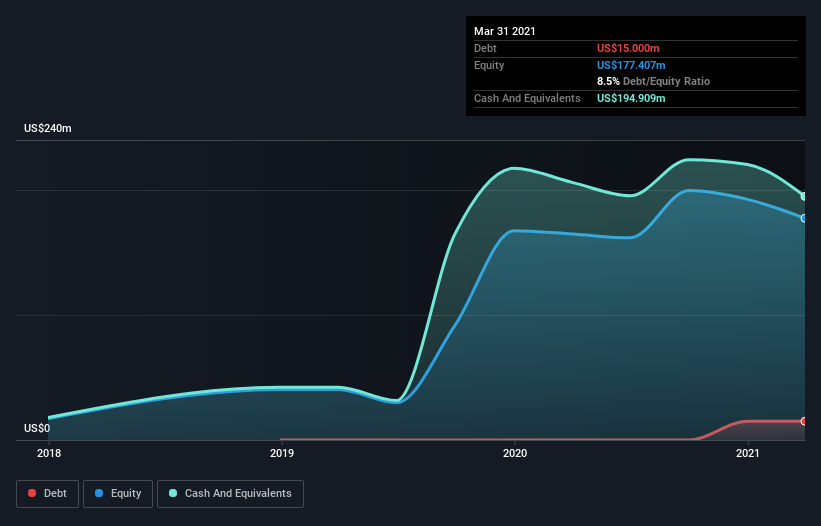Frequency Therapeutics (NASDAQ:FREQ) Has Debt But No Earnings; Should You Worry?
The external fund manager backed by Berkshire Hathaway's Charlie Munger, Li Lu, makes no bones about it when he says 'The biggest investment risk is not the volatility of prices, but whether you will suffer a permanent loss of capital.' So it might be obvious that you need to consider debt, when you think about how risky any given stock is, because too much debt can sink a company. As with many other companies Frequency Therapeutics, Inc. (NASDAQ:FREQ) makes use of debt. But is this debt a concern to shareholders?
When Is Debt A Problem?
Debt and other liabilities become risky for a business when it cannot easily fulfill those obligations, either with free cash flow or by raising capital at an attractive price. If things get really bad, the lenders can take control of the business. However, a more usual (but still expensive) situation is where a company must dilute shareholders at a cheap share price simply to get debt under control. Of course, plenty of companies use debt to fund growth, without any negative consequences. The first thing to do when considering how much debt a business uses is to look at its cash and debt together.
See our latest analysis for Frequency Therapeutics
What Is Frequency Therapeutics's Debt?
The image below, which you can click on for greater detail, shows that at March 2021 Frequency Therapeutics had debt of US$15.0m, up from none in one year. But it also has US$194.9m in cash to offset that, meaning it has US$179.9m net cash.
A Look At Frequency Therapeutics' Liabilities
We can see from the most recent balance sheet that Frequency Therapeutics had liabilities of US$18.9m falling due within a year, and liabilities of US$45.2m due beyond that. Offsetting these obligations, it had cash of US$194.9m as well as receivables valued at US$2.89m due within 12 months. So it actually has US$133.7m more liquid assets than total liabilities.
This surplus strongly suggests that Frequency Therapeutics has a rock-solid balance sheet (and the debt is of no concern whatsoever). With this in mind one could posit that its balance sheet means the company is able to handle some adversity. Simply put, the fact that Frequency Therapeutics has more cash than debt is arguably a good indication that it can manage its debt safely. When analysing debt levels, the balance sheet is the obvious place to start. But it is future earnings, more than anything, that will determine Frequency Therapeutics's ability to maintain a healthy balance sheet going forward. So if you're focused on the future you can check out this free report showing analyst profit forecasts.
Over 12 months, Frequency Therapeutics made a loss at the EBIT level, and saw its revenue drop to US$34m, which is a fall of 5.1%. We would much prefer see growth.
So How Risky Is Frequency Therapeutics?
Statistically speaking companies that lose money are riskier than those that make money. And we do note that Frequency Therapeutics had an earnings before interest and tax (EBIT) loss, over the last year. And over the same period it saw negative free cash outflow of US$68m and booked a US$42m accounting loss. Given it only has net cash of US$179.9m, the company may need to raise more capital if it doesn't reach break-even soon. Overall, its balance sheet doesn't seem overly risky, at the moment, but we're always cautious until we see the positive free cash flow. When analysing debt levels, the balance sheet is the obvious place to start. However, not all investment risk resides within the balance sheet - far from it. To that end, you should learn about the 4 warning signs we've spotted with Frequency Therapeutics (including 1 which is significant) .
If, after all that, you're more interested in a fast growing company with a rock-solid balance sheet, then check out our list of net cash growth stocks without delay.
This article by Simply Wall St is general in nature. It does not constitute a recommendation to buy or sell any stock, and does not take account of your objectives, or your financial situation. We aim to bring you long-term focused analysis driven by fundamental data. Note that our analysis may not factor in the latest price-sensitive company announcements or qualitative material. Simply Wall St has no position in any stocks mentioned.
Have feedback on this article? Concerned about the content? Get in touch with us directly. Alternatively, email editorial-team (at) simplywallst.com.

 Yahoo Finance
Yahoo Finance 
